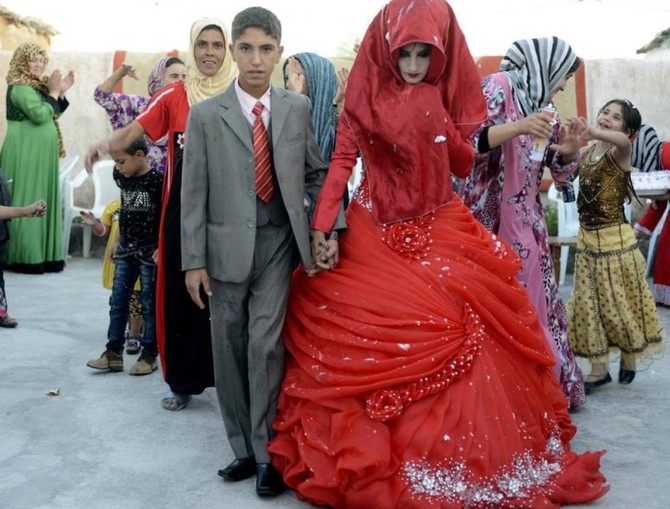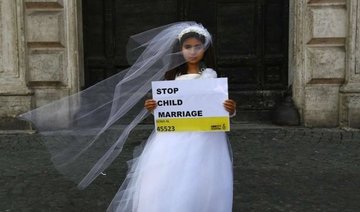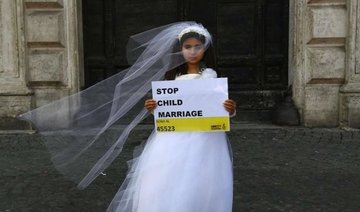BAGDHAD: A proposal in Iraq’s parliament to scrap the minimum age for Muslim girls to marry has stirred outrage among critics who view it as a license “to rape children.”
Conservative Shiite deputies on October 31 proposed an amendment to a 1959 law that set the minimum age for marriage at 18.
The initial legislation, passed shortly after the fall of the Iraqi monarchy, transferred the right to decide on family affairs from religious authorities to the state and its judiciary.
But now the new bill looks to go back on that — and would authorize the marriage of any girl if it had the consent of the religious leaders from the Shiite or Sunni Muslim community to which her parents belong.
In effect, it makes “the opinion of the Shiite and Sunni ulema (scholars) obligatory for judges,” said a liberal independent MP, Faiq Al-Sheikh, a member of Iraq’s legal commission.
Historically, he recalled, Islam has allowed the marriage of pubescent girls from the age of nine, the same as Aisha when she is believed to have been married to the Prophet Muhammad.
Social media has been flooded with criticism of the parliamentary bill, ranging from outright indignation to black humor, with anger also rife on the streets.
“It’s a law worthy of the Islamic State (jihadist group) that provides legal cover to the rape of children,” Hadi Abbas, an army retiree in the southern city of Kut, said.
Ali Lefta, a 40-year-old teacher in the port city of Basra, said it amounted to “the murder of the innocence of children” and that the bill was “the latest in a string of stupid laws based on tribal and confessional modes of thinking.”
In defense of the bill sponsored by his party, Ammar Toama, who heads the Shiite parliamentary group Fadila, said it “makes no mention of age and stipulates only that she (bride) must be pubescent, capable of deciding, and have the accord of her tutor and a judge.”
Under the Iraqi constitution, citizens have to declare their religious affiliation on certain issues. Marriage and inheritance terms for Shiites differ from those for Sunnis.
Toama said the bill’s aim was to bring the law “in line with the beliefs” of practicing Muslims.
But foreign missions in Baghdad and the United Nations have been up in arms, warning against institutionalized discrimination against women and girls.
Many Iraqis like Safia Mohssen, a mother of three girls, also remain opposed and have taken to mocking the priorities of parliamentarians.
“We have war, crises, unemployment, and yet our parliament is busy with laws that violate children’s rights!” she fumed. “The Islamists want to take us back to the Middle Ages.”
Majeda Al-Tamimi, a woman legislator, said she was confident that many of her colleagues in parliament would oppose the bill.
But whether it passes or not, women like Umm Mohammed in the conservative rural province of Zi Qar, who wed at the age of 14, said marriage was a family affair.
“Only families know when their daughter has reached puberty and at what age she can marry,” said the 65-year-old Iraqi.


‘Child marriage’ bill stirs outrage in Iraq
‘Child marriage’ bill stirs outrage in Iraq

Israeli strikes on Lebanon kill 31, wound 149: health ministry

Beirut, Lebanon: Israeli strikes on Lebanon have killed at least 31 people and wounded 149, the Lebanese health ministry said on Monday, as Israel’s military threatened to intensify its attacks following Hezbollah rocket fire.
The ministry said in a statement that “Israeli enemy raids” on Beirut’s southern suburbs and southern Lebanon “have resulted, in an initial count, in the killing of 31 citizens and the wounding of 149 citizens.”
The ministry said in a statement that “Israeli enemy raids” on Beirut’s southern suburbs and southern Lebanon “have resulted, in an initial count, in the killing of 31 citizens and the wounding of 149 citizens.”
© 2026 SAUDI RESEARCH & PUBLISHING COMPANY, All Rights Reserved And subject to Terms of Use Agreement.












